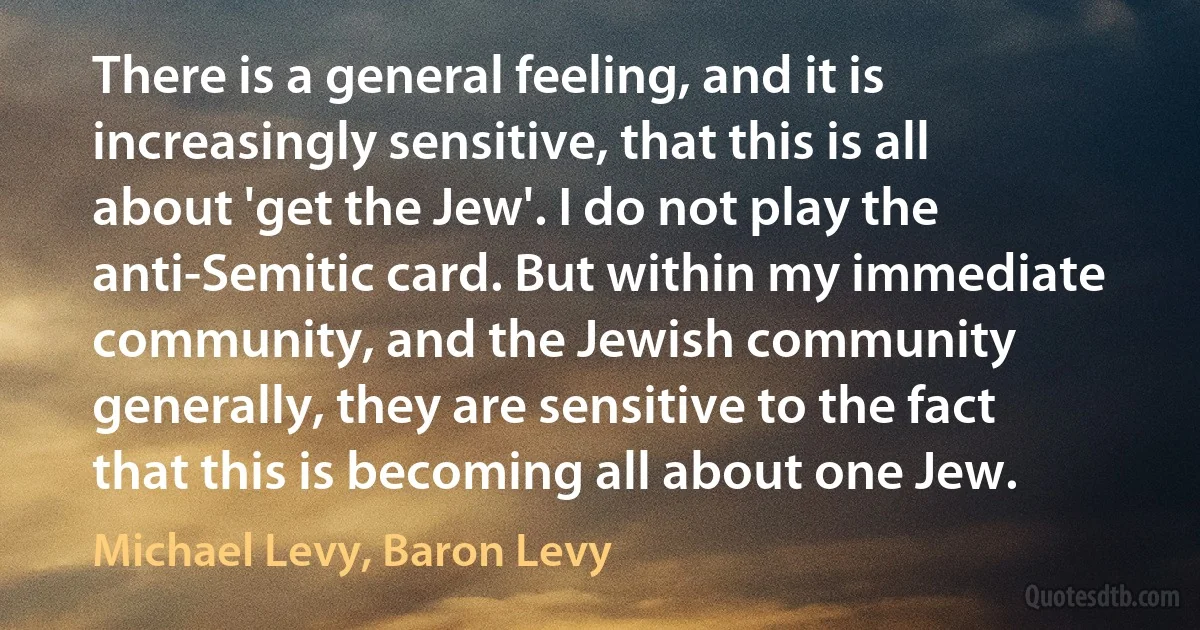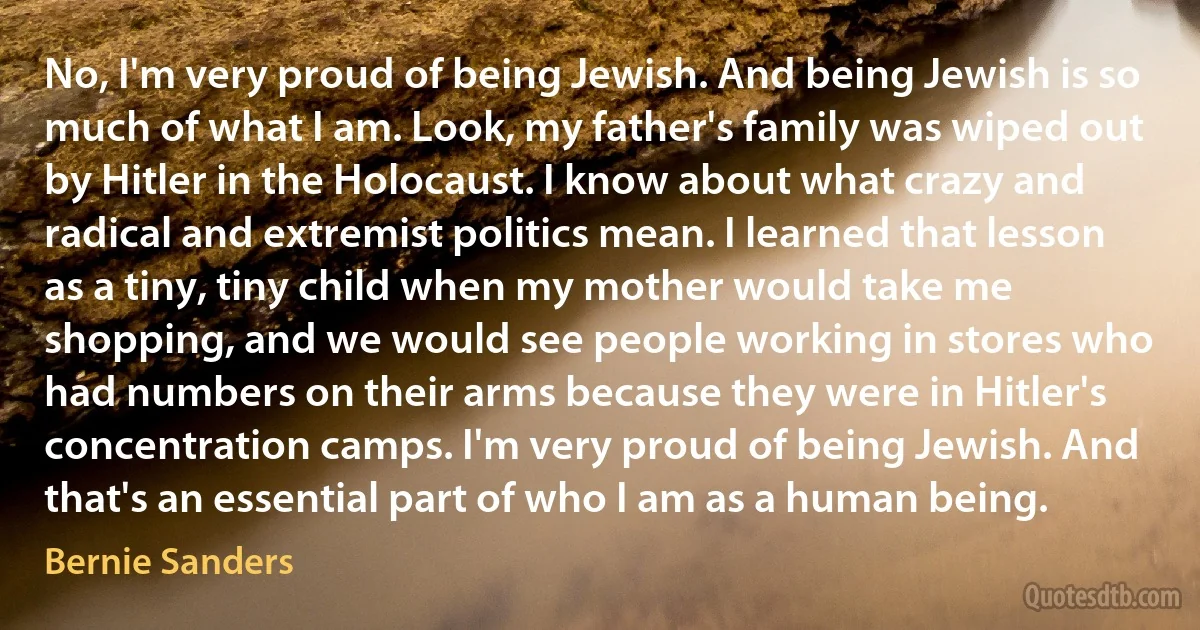Jewish Quotes - page 44
Burchill divides up the chosen people into Good Jews (hardliners, Israelites) and Bad Jews (liberal Jews) with the enthusiasm of an antisemite. Hilariously, she sets herself up as the Jewishness Police, railing against Jews who are not Jewish enough; and one of those, it turns out, is her local rabbi, Elli Tikvah Sarah. Burchill rails against the rabbi for, in this order: ignoring a bottle of champagne Burchill gave her in favour of elderflower wine made by the rabbi's girlfriend; "canoodling" with said girlfriend ("a Sapphic free-for-all", sneers the heretofore not exactly prudish Burchill), and advocating a dialogue with Islam.
Burchill doesn't include this in the book but, according to Rabbi Sarah, Burchill emailed the synagogue's congregants railing that "your rabbi respects PIG ISLAM". Aww, being used as a launchpad for a British columnist's racism – we're living in the Promised Land now, fellow Jews!

Julie Burchill
He denied personal immortality, and worshiped reason alone. He appears to have had no sexual life, existed austerely, and sensibly allowed his most important writings, including the "Ethics," only a posthumous publication. As a teacher of reality, he practiced his own wisdom, and was surely one of the most exemplary human beings ever to have lived. He troubles me most by his extraordinary autonomy, all but unique in that Jewish history of which he did not desire to be a participant, in any way whatsoever.

Baruch Spinoza
When reading the story of Yeshu one is reminded of another Jew who, like Yeshu, became one of the most influential people in all of history but was also condemned and rejected by the Jews – Baruch Spinoza of Amsterdam (1632-1677). He, too, had been fully part of the Jewish community, then started to oppose Judaism, broke away at a young age and became one of the greatest secular Jewish philosophers ever. He, too, is admired by millions.

Baruch Spinoza
The only successful attempt to free human reason from the authority of religion was that of Spinoza (1632–1677). In his Theologico-Political Treatise (1670) he denied the claims for divine authority based on the text of Scripture and religious tradition. [...] Spinoza was the first secular Jew, and as such, the first secular man. Indeed, he served as the role model for all secular Jews, instituting the precise features that characterized future Jewish secularists.

Baruch Spinoza
One of Spinoza's most important conclusions is that of the human being's necessity to overcome the contradiction between the finite and the infinite. Spinoza was able to express the very nature of the Judaeo-Christian way of thought and, at the same time, to remain outside it and even negate it. Both in the Jewish and the Christian traditions, God creates the world but is outside it. Spinoza, on the other hand, would not say that God creates the world, but that He produces it – in philosophical terms, He causes it. God, for Spinoza, is not outside the world and this view was the object of very harsh criticism by his contemporaries. The Jewish community in Holland even saw fit to excommunicate him. The God of Judeao-Christian thought, according to Spinoza, is an invention of man, who imagines that God thinks and acts as human beings do.

Baruch Spinoza
[Alberto Knox] Spinoza belonged to the Jewish community of Amsterdam, but he was excommunicated for heresy. Few philosophers in more recent times have been so blasphemed and so persecuted for their ideas as this man. It happened because he criticized the established religion. He believed that Christianity and Judaism were only kept alive by rigid dogma and outer ritual. He was the first to apply what we call a historico-critical interpretation of the Bible.

Baruch Spinoza
...[I]t was the Goethe problem. He [Alfred Rosenberg] worshipped Goethe. And Goethe worshipped Spinoza. Alfred could not rid himself of this cursed book because Goethe loved it enough to carry it in his pocket for an entire year. This obscure Jewish nonsense had calmed Goethe's unruly passions and made him see the world more clearly than ever before. How could that be? Goethe saw something in it that he could not discern.

Baruch Spinoza
Israeli-American actress Natalie Portman again lashed at Israeli policies in an interview published in a Palestinian-owned newspaper Thursday, calling the controversial Nation-State Law "racist" and a "mistake." Portman, born Neta-Lee Hershlag in Jerusalem, also told the London-based Al- Quds Al-Arabi that law "oppressed Palestinians.”... The Nation-State Law... defines Israel as "the national home of the Jewish people.” It also drops Arabic as an official language... it has stoked anger among critics who, like Portman, argue that it is racist. Portman said she "doesn't agree” with the principle of the contentious law. "It's a mistake... I only hope that we will really love our neighbors and work together," she said.

Natalie Portman
Stock-exchange capital is not productive but parasitically hoarded capital. It is no longer tied to the soil but rootless and internationalist; it does not produce but has infiltrated the normal production process in order to drain profits from it. It consist of movable assets, i.e. raw cash; its chief carrier is Jewish high finance, whose goal is to put the producing populace to work, then pocket the proceeds from their labor.

Joseph Goebbels
I now appreciate that Arabs and Jews were all a Semitic people originally + it is the influx of foreign, European Jews (especially from Poland, they say) which has helped to cause great problems.
I know there are so many complex issues, but how can there ever be an end to terrorism unless the causes are eliminated?
Surely some US president has to have the courage to stand up and take on the Jewish lobby in US? I must be naive, I suppose!

Charles III
I do not look upon the French Revolution as a question subject to the ordinary calculation of politics; it is a thing which is to be; and, as all human experience has verified that the new doctrine ever finally subverts the old, as the Mosaic law subverted idolatry, as Christianity subverted the Jewish dispensation, as the Reformation subverted popery, so, I am firmly convinced, the doctrine of republicanism will finally subvert that of monarchy and establish a system of just and rational liberty on the ruins of the thrones of the despots of Europe.

Theobald Wolfe Tone
When I talk about the religious attitude of my family, people like to say words about Jewish self-hatred. But there was none of that. There was no wish not to be Jewish. There was no desire to pretend we were something else. In fact, along with his opposition to religion, my father had biblical feeling and knowledge which he shared with me. And this was true to such a degree that I just grew up liking things Jewish, kind of pleased with myself for having had the sense to be born into this family instead of some other. When I left home and lived in the Midwest, it would be one of the first things I would tell people, really-at least in the beginning.

Grace Paley
Those images have proved to be an extraordinary record, made with forebodings of misfortune, that bring alive the flavor of the shtetl, of a Jewish peasant tending geese in the Carpathian Mountains, of tumbledown shacks in the Jewish quarter of Lublin, Poland, of Jewish patriarchs, in long caftans and wearing the furry hat called a shtreimel, trudging through the snow. -- Shepard, Richard.

Roman Vishniac
In his recent book, 'Welcome to the Desert of the Real', famed Slovenian socialist intellectual Slavoj Zizek tackles the Palestinian question in a most unoriginal manner. What concerns him most is not the foundational racism of Zionism and its concrete offspring, a racist Jewish state, nor the racist curricula of Israeli Jewish schools, the racist Israeli Jewish media representations of Palestinians, the racist declarations of Israeli Jewish leaders on the right and on the left, or the Jewish supremacist rights and privileges guiding Zionism and Israeli state laws and policies -- all of which seem of little concern to him -- but rather Arab 'anti-Semitism' which should not be 'tolerated'. Arabs are in fact reacting to Zionist Jewish colonialism and its commitment to European white supremacy in Jewish guise.

Joseph Massad
Christ, one of the great men of humanity, condemned Judah with the sharpest words. He cursed and damned their devilish goals. His whole life was an antisemitic struggle against Judah and its methods. The Jew Paul, born Saul, also called Schaul, transformed the honest, noble and elevated goals of the founder of the Christian religion into its very opposite, making them serve Jewish purposes. That may not dim the light of this great man of human history.

Robert Ley
He [Jesus] could have been that [a healer and exorcist]--indeed, he could have been "the most extraordinary figure in ... the stream of Jewish charismatic healers," as the same New Testament scholar goes on to say--without attracting more than local attention. What made him outlive his time and place was the way he used the Spirit that coursed though him not just to heal individuals but -- this was his aspiration -- to heal humanity, beginning with his own people.

Huston Smith
If I were asked under what sky the human mind has most fully developed some of its choicest gifts, has most deeply pondered over the greatest problems of life, and has found solutions of some of them which well deserve the attention even of those who have studied Plato and Kant, I should point to India. And if I were to ask myself from what literature we who have been nurtured almost exclusively on the thoughts of Greeks and Romans, and of the Semitic race, the Jewish, may draw the corrective which is most wanted in order to make our inner life more perfect, more comprehensive, more universal, in fact more truly human a life... again I should point to India.

Max Müller


![Would you believe it – and I honestly mean what I say – I should be happy to give ten years of my life if I could go on sitting here in front of this picture [Rembrandt's 'Jewish Bride'] for a fortnight, with only a crust of dry bread for food? (Rembrandt)](https://cdn.quotesdtb.com/img/quotes_images_webp/66/rembrandt-believe-bread-bride-1013566.webp)
